

Gamification Model Canvas. Gamification uses game-thinking and game mechanics in non-game contexts to solve problems.
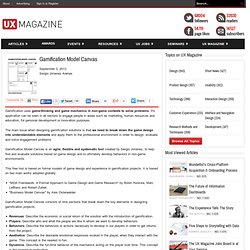
It's application can be seen in all sectors to engage people in areas such as marketing, human resources and education, for personal development or innovation purposes. The main issue when designing gamification solutions is that we need to break down the game design into understandable elements and apply them to the professional environment in order to design, evaluate and solve engagement problems. Gamification Model Canvas is an agile, flexible and systematic tool created by Sergio Jiménez, to help find and evaluate solutions based on game design and to ultimately develop behaviors in non-game environments.
This free tool is based on formal models of game design and experience in gamification projects. Game Design Canvas. Get the Game Design Canvas Game Design Canvas by Budd Royce Lam is licensed under aCreative Commons Attribution-ShareAlike 3.0 Unported License.
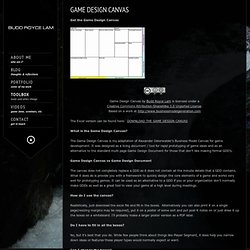
Based on a work at The Excel version can be found here: DOWNLOAD THE GAME DESIGN CANVAS What is the Game Design Canvas? The Game Design Canvas is my adaptation of Alexander Osterwalder’s Business Model Canvas for game development. Game Design Canvas vs Game Design Document The canvas does not completely replace a GDD as it does not contain all the minute details that a GDD contains. How do I use the canvas? Realistically, just download the excel file and fill in the boxes. Do I have to fill in all the boxes? No, but it’s best that you do. Hyperbole Games. I bumped into Corey Young on Twitter like I have many of my design peers.
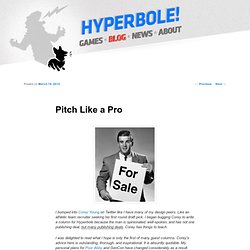
Like an athletic team recruiter seeking his first round draft pick, I began bugging Corey to write a column for Hyperbole because the man is opinionated, well-spoken, and has not one publishing deal, but many publishing deals. Corey has things to teach. I was delighted to read what I hope is only the first of many guest columns. Corey’s advice here is outstanding, thorough, and inspirational. It is absurdly quotable. Guest Column by: Corey Young (CoreyYoung.com) You’ve created the best boardgame since Senet, yet for some reason the big publishers haven’t sent a limousine to pick you up. If you think about it, you have several face-to-face opportunities with publishers each year. Does it work? The techniques I use are simple, but it requires a bit of preparation and finesse. (Step 1) Ensure that your game is ready: The goal of a pitch is for the publisher’s representative to look at your prototype. Quick Concept Format: A Method for Developing Game Concepts.
I use this method along with other ideation methods (i.e. brainstorming).
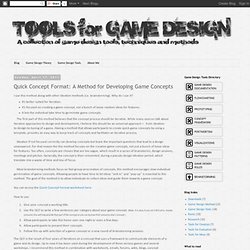
Why do I use it? It’s better suited for iteration.It’s focused on creating a game concept, not a bunch of loose random ideas for features. It lets the individual take time to germinate game concepts. The first part of this method believes that the concept process should be iterative. While many sources talk about iterative approaches to design and development, I believe this should be an universal approach— from ideation-to-design-to-tuning of a game.
Ideation if not focused correctly can develop concepts but leave the important questions that lead to a design unanswered. Most brainstorming methods focus on fast-group-procreation of concepts, this method encourages slow-individual-germination of game concepts. You can access the Quick Concept Format worksheet here. How to use: Give your concept a working title. What a Pitch! Games Concepts. These pages describe mechanisms and guidelines for the development of games (board games), more specific games that can be played in social environment (friends, family, etc.).
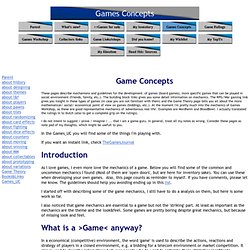
The building block links gives you some detail information on mechanics. The RPG/War gaming link gives you insight in these types of games (in case you are not familiair with them) and the Game Theory page tells you all about the more mathematical/ social/ economical point of view on games (biddings, etc.). At the moment I'm pretty much into the mechanics of Games Workshop, as these are good representative mechanics of 'adventerous real life'. Examples are Mordheim and BloodBowl. I actually translated the rulings in to Dutch (also to get a complete grip on the rulings). I do not intent to suggest / prove / imagine / ... that I am a game-guru. In the Games_UC you will find some of the things i'm playing with.
If you want an instant link, check TheGamesJournal The main characteristics of a game are: Customizable Games. From the Vault – The BioShock Pitch.